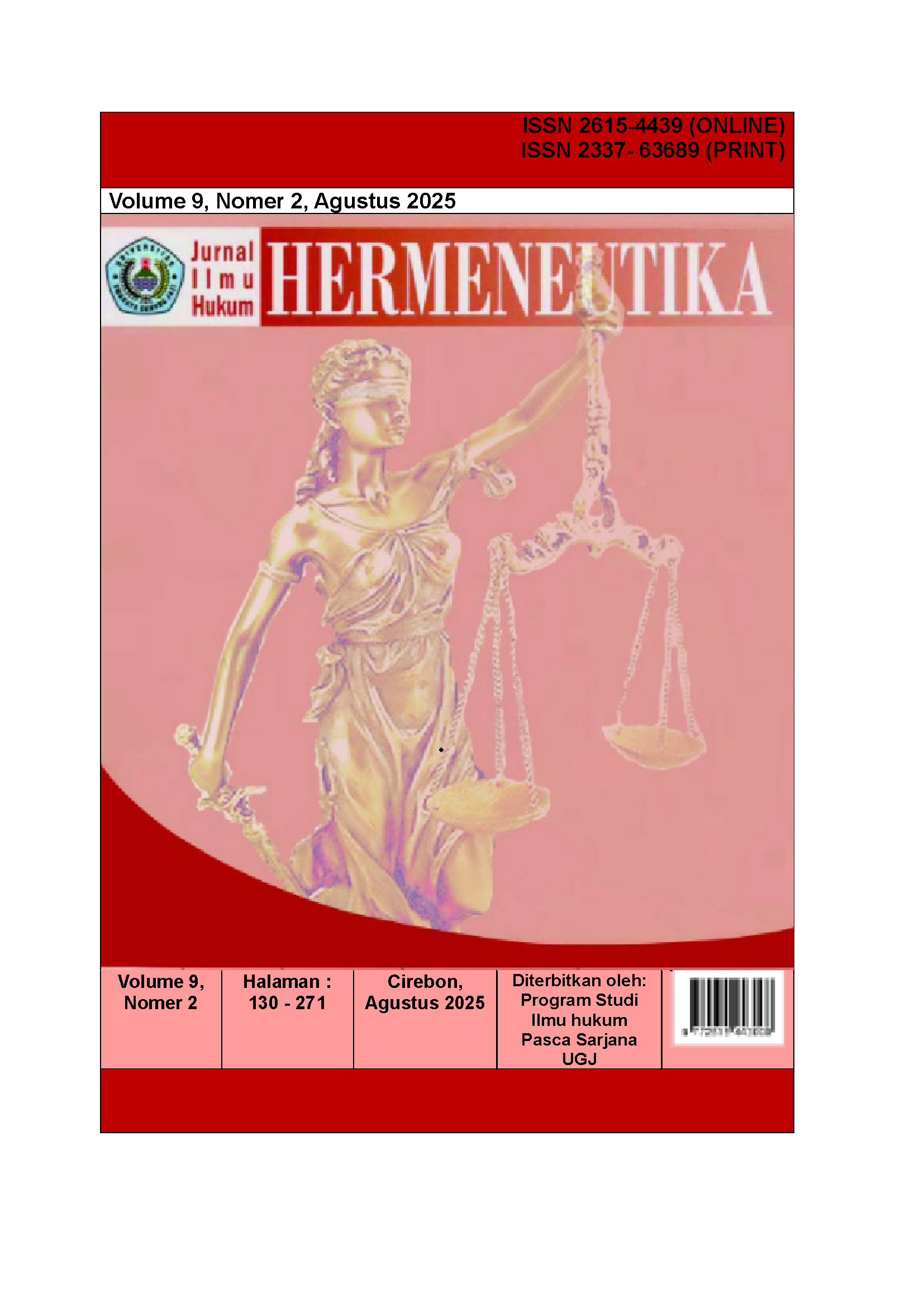CHALLENGES OF E-COURT IMPLEMENTATION IN STATE ADMINISTRATIVE CASES: A REVIEW OF REGULATIONS AND PRACTICE IN THE FIELD
TANTANGAN IMPLEMENTASI E-COURT DALAM PERKARA TATA USAHA NEGARA: TINJAUAN REGULASI DAN PRAKTEK DI LAPANGAN
DOI:
https://doi.org/10.33603/hermeneutika.v9i2.10426Keywords:
Education, Rights, Persons with Disabilities, Discrimination, Protection Facilitation.Abstract
P
The implementation of the e-Court system in State Administration cases is a strategic step in the context of modernizing the judicial system in Indonesia. Through regulations such as PERMA No. 3 of 2018 and PERMA No. 1 of 2019, the Supreme Court encourages the digitization of administrative and trial processes to create a simple, fast, transparent, and low-cost judiciary. However, its implementation in various State Administrative Courts has not been optimal. Technical challenges, including inadequate infrastructure, limited human resources, and digital literacy gaps, continue to be significant obstacles. In addition, normative constraints, such as e-litigation procedures that rely on the parties' consent, contribute to the complexity of their implementation. This article employs an empirical juridical approach to assess the effectiveness of applicable regulations and their practical implementation in the field. The study's results suggest that regulatory harmonization, technical capacity building, and ongoing education are necessary to ensure that e-Court is an effective solution for administrative justice reform in Indonesia.
References
Agung, Ketua Mahkamah, and Republik Indonesia. “Pasal 1 Ayat 7 PERMA No. 1 Tahun 2019, “tentang Administrasi Perkara Dan Persidangan Di Pengadilan Secara Elektronik,” 2019.
Cindy Priyanka Sari, Ketut, Zakki HA Adlhiyati Jl Dasuki Nomor, Duren Sawit, and Jakarta Timur. “Perluasan Objek Pengadilan Tata Usaha Negara Melalui Undang-Undang Nomor 30 Tahun.” Tentang Administrasi Pemerintahan, no. 30 (2014): 305–10.
Dewi, Anies Prima, Baiq Asri Rahmawati, Asri, Hairul Maksum, and Aminullah. “Pelaksanaan Peradilan Elektronik (E-Court) Dalam Penyelesaian Di Pengadilan Tata Usaha Negara Mataram.” Jurnal Fakultas Hukum Universitas Gunung Rinjani 5, no. 0376 (2024): 123–30.
E-court, Peradilan Melalui. “TANTANGAN ERA DIGITALISASI DALAM PROSES ADMINISTRASI J” 7, no. 1 (2025): 154–66.
Fakhruddin, Hendri, and Ferdricka Nggeboe. “Proses Administrasi Perkara Pidana Dalam Penyelesaian Perkara Pidana Di Pengadilan Tinggi Jambi.” Legalitas: Jurnal Hukum 10, no. 2 (2019): 175. https://doi.org/10.33087/legalitas.v10i2.161.
Herawati, Ani. “Implementasi E‑Litigation Di Pengadilan Negeri Lhokseumawe.” Yudisial 14 (2021).
Hidayat, Asep Syarifuddin, Faris Satria Alam, and Muhammad Ishar Helmi. “Consumer Protection on Peer to Peer Lending Financial Technology in Indonesia.” International Journal of Scientific and Technology Research 9, no. 1 (2020): 4069–72.
Kusuma, Muhammad Noor Halim Perdana & Bimasakti, Muhammad Adiguna. Panduan Beracara Di Peradilan Tata Usaha Negara Dan Persidangan Elektronik (e-Litigasi). Jakarta, 2020.
Mahkamah Agung Republik Indonesia. “Buku Panduan E-Court Mahkamah Agung 2019 : The Electronic Justice System.” Mahkamah Agung Republik Indonesia, 2019, 1–84.
Mahkamah Agung RI. “Eraturan Mahkamah Agung Republik Indonesia Nomor 1 Tahun 2019 Tentang Administrasi Dan Persidangan Di Pengadilan Secara Elektronik, Lembaran Negara Tahun 2019 Nomor 843.” JDIH MA RI, n.d.
Pemerintah Indonesia. Peraturan Mahkamah Agung Nomor 7 Tahun 2022 tentang Perubahan atas Peraturan Mahkamah Agung Nomor 1 Tahun 2019 tentang Administrasi Perkara dan Persidangan di Pengadilan secara Elektronik (2022).
UU Republik Indonesia Nomor 48 Tahun 2009 Tentang kekuasaan kehakiman, 19 Penerbit resmi dokumen (Sekretariat Negara) § (2009).
Pemerintah Republik Indonesia. “Juklak Dirjen BADILUM - Perma Nomor 3 Tahun 2018,” 2018.
Perubahan Atas Undang-Undang Nomor 5 Tahun 1986 Tentang Peradilan Tata Usaha Negara, 2003 Indonesia § (1986).
RI, Mahkamah Agung. “Peraturan Mahkamah Agung Republik Indonesia Nomor 1 Tahun 2018 Tentang Administrasi Perkara Di Pengadilan Secara Elektronik, Lembaran Negara Tahun 2018 Nomor 1312,” n.d. https://jdih.mahkamahagung.go.id/.
Saputra, H. & Ali, M. “Digitalisasi Peradilan Tata Usaha Negara: Integrasi Sistem Dan Efektivitas Penanganan Perkara.” Verstek 9 no 1 (2022).
Selva. “PENGARUH DIMENSI-DIMENSI NILAI YANG DIPERSEPSIKAN, KEPUASAN, KETERLIBATAN, DAN KEPERCAYAAN MEREK PADA LOYALITAS MEREK” 2, no. 2 (2016): 1–30.
Simatupang, M. “Tantangan E‑Court Dalam Perkara Administrasi Negara.” Jurnal Hukum & Teknologi 3, no. 2 (2021).
Downloads
Published
Issue
Section
Citation Check
License
Copyright (c) 2025 Jhian Nafizha Hamada, Taufiq Alamsyah

This work is licensed under a Creative Commons Attribution-ShareAlike 4.0 International License.
The Authors submitting a manuscript do so on the understanding that if accepted for publication, copyright of the article shall be assigned to Jurnal HERMENUTIKA, Sekolah Pascasarjana Ilmu Hukum. Universitas Swadaya Gunung Jati as publisher of the journal. Copyright encompasses rights to reproduce and deliver the article in all form and media, including reprints, photographs, microfilms, and any other similar reproductions, as well as translations.
Jurnal HERMENEUTIKA, Universitas Swadaya Gunung Jati and the Editors make every effort to ensure that no wrong or misleading data, opinions or statements be published in the journal. In any way, the contents of the articles and advertisements published in Jurnal HERMENEUTIKA are the sole responsibility of their respective authors and advertisers.










